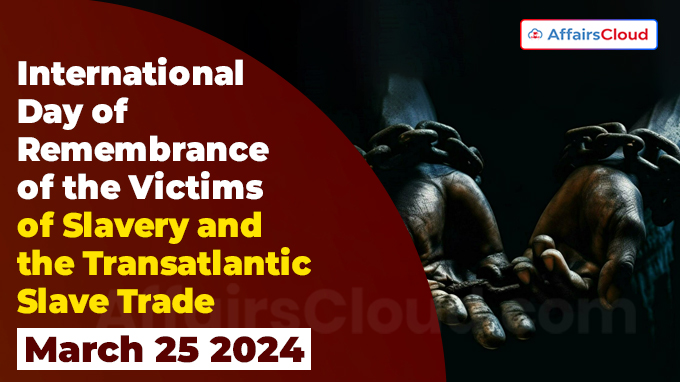 The United Nations (UN) International Day of Remembrance of the Victims of Slavery and the Transatlantic Slave Trade is annually observed across the globe on 25 March to honour and remember the lives of those who suffered and died as a result of the transatlantic slave trade.
The United Nations (UN) International Day of Remembrance of the Victims of Slavery and the Transatlantic Slave Trade is annually observed across the globe on 25 March to honour and remember the lives of those who suffered and died as a result of the transatlantic slave trade.
- This Day also aims to raise awareness about the dangers of racism and prejudice.
The International Day of Remembrance of the Victims of Slavery and the Transatlantic Slave Trade 2024 was observed under the theme “Creating Global Freedom: Countering Racism with Justice in Societies and Among Nations.”
Background:
i.On 17 December 2007, the UN General Assembly (UNGA) passed the resolution A/RES/62/122 and proclaimed the 25 March of every year as an International Day of Remembrance of the Victims of Slavery and the Transatlantic Slave Trade.
ii.The resolution entitled “Permanent memorial to and remembrance of the victims of slavery and the transatlantic slave trade”, also called for the establishment of a programme of educational outreach.
iii.The 1st ever International Day of Remembrance of the Victims of Slavery and the Transatlantic Slave Trade was observed on 25 March 2008.
Note: 25 March was designated as a complement to the existing International Day for the Remembrance of the Slave Trade and its Abolition by the United Nations Educational, Scientific and Cultural Organization (UNESCO).
Similar Observance:
In 1997, UNESCO established 23 August as International Day for the Remembrance of the Slave Trade and its Abolition, to commemorate the uprising in 1791 against the slave trade in Saint Domingue (now the Republic of Haiti).
Outreach Programme on the Transatlantic Slave Trade and Slavery:
i.On 28 November 2006, the UNGA adopted the resolution A/RES/61/19, establishing the Outreach Programme on the Transatlantic Slave Trade and Slavery.
ii.The programme is mandated by the UNGA:
- to mobilise remembrance of the victims of the transatlantic slave trade and slavery;
- to educate and inculcate in future generations an understanding of the lessons, history and consequences of slavery and the slave trade;
iii.The Outreach Programme aims to motivate youth and members of civil society to stand up against racism.
Actions:
The Department of Global Communications closely coordinates with the Office of the UN High Commissioner on Human Rights (OHCHR) to highlight the modern-day impact of the slave trade, particularly on people of African descent.
- Emphasis is placed on advocating for human rights and combating racial discrimination.
Significance of the Day:
i.The Day acknowledges the millions of Africans enslaved over 400 years, highlighting the dehumanizing conditions and human rights violations endured.
ii.It emphasises universal human rights that remain the driving force behind many of the movements during the UN’s International Decade for People of African Descent (2015-2024).
Note: In 2013, UNGA adopted the resolution A/RES/68/237 and proclaimed 2015-2024 as the International Decade for People of African Descent, with the theme “People of African descent: recognition, justice and development.”
Transatlantic Slave Trade:
i.It represents one of the most violent, traumatizing, and darkest chapters in world history.
ii.The transatlantic slave trade was a triangular system that stretched between Europe, Africa, and the Americas.
iii.For over 400 years, more than 15 million men, women and children were the victims of the tragic transatlantic slave trade.
iv.They were kidnapped, forced onto European and American ships, and trafficked across the Atlantic Ocean.
v.They were enslaved, abused, and forever separated from their homes, families, ancestors, and cultures.
2024 Events:
i.To mark the International Day of Remembrance of the Victims of Slavery and the Transatlantic Slave Trade, as well as the final year of the International Decade for People of African Descent (2015-2024), the UN will host 2 new exhibits:
1.“Who were the enslaved? Commemorating lives under enslavement at the Cape of Good Hope”:
The UN Outreach Programme on the Transatlantic Slave Trade and Slavery in collaboration with the Iziko Museums of South Africa organised the exhibit from 19 March-25 April 2024 in New York, United States of America (USA)
2.“Ibo Landing”:
The UN Outreach Programme on the Transatlantic Slave Trade and Slavery is supporting the UN Population Fund (UNFPA) for this exhibit, which is organised from 25-28 March 2024 in, Vienna Café, New York.




